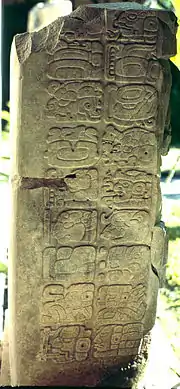Chak Tok Ichʼaak I
Chak Tok Ichʼaak I[N 1] also known as Great Paw, Great Jaguar Paw, and Toh Chak Ichʼak (died 14 January 378) was an ajaw of the Maya city of Tikal. He took the throne on 7 August 360? and reigned until his death in 378, apparently at the hands of invaders from central Mexico.[N 2][2]
| Chak Tok Ichʼaak I | |
|---|---|
| Ajaw | |
 Stela 26 at Tikal bears the name Chak Tok Ichʼaak, although it is unclear if it is referring to Chak Tok Ichʼaak I or Chak Tok Ichʼaak II.[1] | |
| King of Tikal | |
| Reign | 7 August 360? - 14 January 378 |
| Predecessor | Kʼinich Muwaan Jol I |
| Successor | Yax Nuun Ahiin I |
| Died | 14 January 378 Tikal |
| Father | Kʼinich Muwaan Jol I |
| Mother | Lady Bahlam Way |
| Religion | Maya religion |
| Signature |  |
Born to Kʼinich Muwaan Jol and Lady Bahlam Way, Chak Tok Ichʼaak I is one of Tikal's best known kings. His name is recorded on a number of ceramic pieces and stelae. Stela 39, which was discovered by archaeologists in the Mundo Perdido complex, was produced to commemorate the Kʼatun ending in 376. It depicts the king standing upon a bound captive while holding an ax decorated with jaguar markings that was probably used as either a weapon or an instrument of sacrifice.
His name also appears on the fragmentary Stela 26 from Tikal's North Acropolis, which he may have dedicated. Both stelae were deliberately smashed soon after being dedicated. Another stela from the distant site of El Temblor may have been created to mark his accession to power, but it is possible that it may instead have been dedicated to a namesake.[2]
His palace was located in the Central Acropolis and was identified from a carved clay vessel which had been interred under the western staircase as part of a dedication ritual. Unusually, it was never built over by later rulers, and was kept in repair for centuries as an apparently revered monument.[2]
Stela 31 from Tikal records that Chak Tok Ichʼaak I died on the same day that Siyaj Kʼakʼ, probably a war-leader from Teotihuacan, entered Tikal. The arrival of Siyaj Kʼakʼ probably represented a forcible takeover, perhaps a conquest, which resulted in the death of Chak Tok Ichʼaak I. The dead ruler's entire lineage was overthrown and a new line of rulers took power in their place, starting with Yax Nuun Ahiin I.[4]
Notes
- The ruler's name, when transcribed, is CHAK-TOK-ICHʼA꞉K, translated "Great Misty? Claw", Martin & Grube 2008, p.28.
- These are the dates indicated on the Maya inscriptions in Mesoamerican Long Count calendar, Accession: 8.16.3.10.2 11 Ikʼ 10 Sek and Death: 8.17.1.4.12 11 Eb 15 Mak, Martin & Grube 2008, p.28.
Footnotes
- Guenter, Stanley Paul (2014). "Dating Stela 26 of Tikal". The PARI Journal. Ancient Cultures Institute. 14 (3): 13–17.
- Martin & Grube 2008, p.28.
- Martin & Grube 2008, p.29.
References
- Harrison, Peter D. (2003). "The Central Acropolis of Tikal". In Jeremy A. Sabloff (ed.). Tikal: Dynasties, Foreigners, & Affairs of State: Advancing Maya Archaeology. Santa Fe, New Mexico, US and Oxford, UK: School of American Research Press and James Currey. pp. 171–206. ISBN 1-930618-22-0. OCLC 51059120.
- Martin, Simon; Nikolai Grube (2008). Chronicle of the Maya Kings and Queens: Deciphering the Dynasties of the Ancient Maya (2nd ed.). London and New York: Thames & Hudson. ISBN 9780500287262. OCLC 191753193.
- Sharer, Robert J.; Traxler, Loa P. (2006). The Ancient Maya. Stanford University Press. ISBN 978-0-8047-4817-9.
.png.webp)